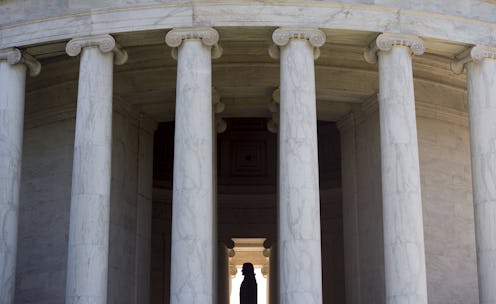News
How To Become POTUS Without Winning The Election
There's actually a way to become president without winning the general election. It's an unlikely scenario, but one that has happened before, albeit long ago. In order to win the general election, a candidate must secure more than half of all available Electoral College votes — that is, 270. The Constitution contains a provision for what to do in case no candidate reaches that magic number from the popular vote, enabling a candidate to become president without winning the election.
The 12th Amendment to the Constitution dictates that, should no candidate receive an electoral vote majority, then the House of Representatives casts ballots to determine the next president from among the top three electoral vote-getters. This has only happened a couple of times before, in 1824 and earlier, in 1800. In the 1824 election, John Quincy Adams received the second-most electoral votes of all candidates, but the House elected him as president in February 1825.
The election of 1800 was a bit different from that scenario. Back then, the Electoral College nominated vice presidents — whichever candidate received the second-most electoral votes. But in 1800, Thomas Jefferson and his running mate Aaron Burr actually tied with 73 electoral votes, so the House had to pick which one got to be president (they voted in Jefferson after 36 ballots in February 1801). After this debacle, the 12th Amendment separated presidential and vice presidential votes.
Though it's only happened twice, and long ago, there was a much more recent election that was close to going to the House. In 2000, George W. Bush won with 271 electoral votes, just barely scraping by in the general.
Overall, the history of presidential elections doesn't paint the House vote scenario as a likely one. But 2016's presidential race has been anything but typical, and Evan McMullin, an independent candidate, is banking on the prospect. In order to become president, he'd have to be within the top three electoral vote-getters. The last time a non-major-party candidate won any electoral votes was in 1968, when American Independent Party candidate George Wallace won 46.
In order to win a state's electoral votes, which are awarded on a winner-take-all basis, a candidate must win a plurality of the state's popular vote. That's an unlikely feat for any non-major-party candidate, particularly one so few people are familiar with who came into the race as late as McMullin.
Even though voter dissatisfaction rates are high on both sides of the major party aisle, current forecasts don't give much basis for hope concerning a brokered election, either. As of late August, FiveThirtyEight's wonks are predicting 352 electoral votes for Clinton in November. This is bolstered by PollyVote's survey of hundreds of political scientists across the country, whose state predictions combine for a tally of 347 for Clinton.
It is possible, though rare, to become president without winning the general election. But you have to win the House election in order to do so, and that means snagging electoral votes in the general. And that means we shouldn't expect to see McMullin pulling a John Quincy Adams in November.
